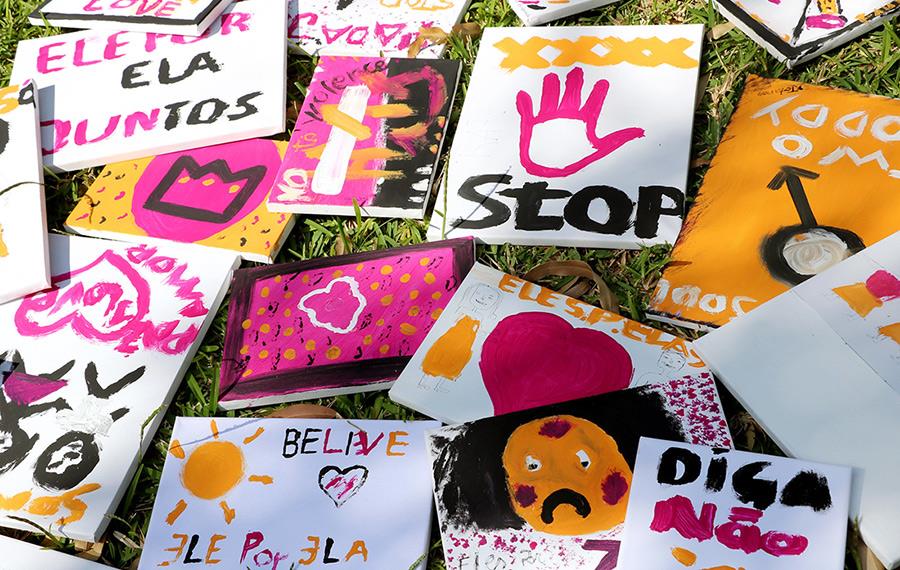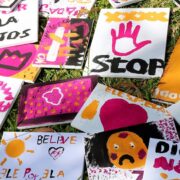
Among Filipinos, there are certain things you don’t talk about that the community has deemed shameful, or nakakahiya.
Chief among these topics include mental and emotional health, and even though there have been significant breakthroughs destigmatizing these complex issues, there’s still so much to unpack and specific areas that are still continually swept under the rug.
There is a multitude of reasons why people, especially Filipinos, avoid talking about domestic violence: it’s messy, it’s painful, and it doesn’t make sense. But according to what we now know about the twofold complications of domestic abuse during a pandemic, maybe it’s actually the best time to talk about it.
In a webinar hosted by the Filipino Young Leaders Program (FYLPRO) and the Philippine Embassy in the United States on Thursday, Dec. 10, experts shared the personal, psychological and legal perspectives of domestic violence as part of the Philippines’ 18-Day Campaign to End Violence Against Women.
Earlier this year, the United Nations released a report that found that cases of physical, psychological and emotional domestic abuse spiked during the COVID-19 pandemic.
Though the demographic makeup of victims and survivors is diverse, domestic violence continues to disproportionately target women and girls.
About 243 million women and girls (aged 15-49) were subject to sexual or physical violence by an intimate partner from April 2019 to April 2020, according to Phumzile Mlambo-Ngcuka, executive director of UN Women. As families and couples continue to be quarantined due to the pandemic, domestic violence, or intimate partner violence (IPV), continues to be an increasingly worrying threat.
Domestic violence is usually characterized as abuse of a spouse or partner in a home setting, and in the United States, it affects more than 10 million people of all genders every year, according to Philippine Ambassador to the U.S. Jose Manuel del Gallego Romualdez, who delivered remarks during Thursday’s webinar.
“Let us be resolved in our commitment to stopping domestic violence and ending violence of the rights and dignities of anyone who is forced to endure such experiences,” he said.
Domestic violence can manifest in many ways, and one person’s experience can look completely different from someone else’s.
For journalist Christine Lee, a victim and survivor who has dedicated her life to shedding the stigmas of domestic abuse among the wider Asian American community, it began innocently in a relationship with a man who would become her abuser.
“First he was so charismatic and that’s what drew me in. We just had this instant connection. I felt like someone finally understood me,” Lee says in a video, describing the “honeymoon phase” of what would become an abusive relationship.
Her partner then began calling her unsavory names when he was upset and became verbally and emotionally abusive, but she said she “kept letting that go because I did want to believe that it was me, that if I fixed this aspect about myself, he would be the prince charming that I originally met.”
But one night after a date, an argument devolved into her partner striking and choking her to the point where she didn’t think she would live. She got the courage to leave the relationship, but she still found herself in a quandary when it came to talking about the topic with her family.
“This is still very much a hush-hush topic in our family. They don’t understand why I’m still talking about this,” Lee explains. “The thing is, I don’t enjoy talking about this because every time I talk about it I’m re-traumatizing myself, but then I think, ‘Is there anyone else out there that’s going to talk about this?’”
Lee’s experience happened years ago, but she knows that the more she destigmatized these conversations in the Asian American community, the closer it gets to providing more resources to victims and survivors within that community.
For Filipinos, the thick barrier between wanting to openly rectify the plight of IPV survivors and community support continues to stifle progress, a longstanding struggle for Filipino American victim advocates for years.
In 1981, a Filipina American domestic violence survivor named Nilda Rimonte opened the first women’s shelter in the U.S. that specifically catered to Asian American and Pacific Islander (AAPI) women who were experiencing domestic abuse and sexual violence.
Rimonte knew personally the complicated dynamics and emotional complexities of AAPI domestic abuse, especially among immigrants, who at that time didn’t have many mental health support options. Rimonte knew that the concept of acceptable behavior within AAPI marriages and couples was blurry, that many Asian cultures did little to curb what she called “wife beating.”
“[Husbands] go home and feel safe, so they feel they are able to hit their wives. They have been told it is OK to hit them…(that) it might be good for her,” Rimonte told the Los Angeles Times in 1986.
The Every Women’s Shelter in LA became a safe haven for AAPI women, most of whom were immigrants, and it offered counseling and legal support as well as a place for AAPI women to support each other.
The programs Rimonte created evolved into the Center for the Pacific Asian Family (CPAF), which continues its work in community engagement and violence prevention, providing multilingual and multicultural transition programs for survivors of IPV. (The center’s website includes 24/7 multilingual hotlines for victims who need help.) Rimonte’s work created a foundation for the kind of activism and destigmatization surrounding IPV that we see today, but understanding the warning signs and red flags in a relationship could be the preventative measure that saves lives.
“Police usually get calls related to domestic violence when an abusive incident turns violent, and I’ve covered countless stories over the year as a TV news reporter on homicides, murder-suicides and things like that, and eventually I thought that domestic violence just meant extreme physical assault,” Lee explained, emphasizing that there are many non-violent forms of abuse that could predicate physical violence.
The road to eradicating domestic abuse is a long and winding one, riddled with misconceptions and obstacles that require an undoing of cultural stigmas and victim-shaming. All the panelists on Thursday’s webinar acknowledged the harm that “Well, why didn’t they just leave?” arguments do to the vast community of IPV victims.
Even when the red flags are present, it’s common for victims to believe that what they’re going through doesn’t warrant abusive behavior. It only becomes clear in retrospect, as in Lee’s experience.
“When I reflect on my past relationship with my abuser, I knew it was much more,” she went on. “Yes, it was assault; that made me finally leave and that’s what prompted the call to the police. But months led up to that incident and in many cases victims and survivors experience years of abuse that’s more than just physical violence. It started out [as] emotional, psychological and verbal abuse.”
Some of the non-physical abuse that Lee detailed included that “honeymoon phase” where the abuser lured her in with “too good to be true charm” that secured her commitment to the relationship. He then began losing his temper in private and in public, often blaming Lee or others instead of taking accountability. He spoke negatively about Lee to her face and isolated her from her family.
Isolation is a key characteristic of domestic abuse and it manifests in codependency and control, according to Ana Jayme, a licensed marriage and family therapist and co-founder of the Long Beach-based group psychotherapy practice Bridges to Healing Counseling and Training Center.
By isolating the victim, the outside world becomes distant, making it difficult for victims to seek help and break away from the relationship. Jayme points out that leaving an abusive relationship is not as easy as deciding to call the police and walking out the door — doubly so for victims who are immigrants.
“Because of isolation, the abuser might be the sole economic supporter of the family and the survivor might not have any knowledge or control of money,” Jayme explained. “They may be thinking. ‘Even if I am to leave, where am I going? I don’t know where to go.’”
The fear that an undocumented immigrant victim would be penalized if they came forward with their story is real, but what many of them may not know is that they actually have specific rights.
“Many Filipino Americans here in the United States on fiance visas or different types of visas may feel afraid or uncomfortable with coming forward and jeopardizing their legal status,” said Joyce King, chief counsel at the Frederick County State’s Attorney’s Office in Maryland.
King, who is Filipina American, said that undocumented victims can self-petition for legal status under the Violence Against Women Act (VAWA), apply for cancellation of removal under the VAWA or apply for a U-visa under VAWA, which is for victims of crime.
King also emphasized that these options differ from other legal criminal processes, which usually require victims coming forward and either swearing by written testimony before a judge or providing an open court testimony. These protocols are “by paper only and they’re not contingent on you having to file a police report” or “deal with the police ever.”
She stressed that anybody who is going through an IPV situation or knows someone who is should seek legal advice. She added that even if a victim who has outstanding criminal charges still can obtain a restraining order against an abuser.
“A lot of these individuals don’t realize how many rights they actually have and how many resources they do have in the law,” King said.
It makes sense that talking about domestic violence, or IPV, is difficult and it’s a struggle trying to unpack the complexities of any given situation. Jayme noted that abusive behavior is cultivated and learned; it’s not inherent.
There’s a social and community responsibility attached to knowing what are and are not healthy behaviors in a relationship. Abusers often have either been the targets of abuse or witnessed domestic abuse themselves, both Jayme and Lee acknowledged. Although this doesn’t excuse abusive behavior, it can help inform and develop healthy, non-abusive family structures.
Years after she left her abusive relationship, Lee admitted that she still feels like she hasn’t received the justice she deserved.
“How can you bring true justice to a situation like mine, where my life was in danger or someone intentionally tried to cause me harm?” Lee remarked, adding that she hopes her abuser fully understands what he has done and the trauma he’s put her through.
“I have a really hard time forgiving my abuser, and I know that is a really important step in the healing process. I’m not quite there yet, but I’m a lot closer than I was several years ago,” she said.
If you’re undocumented and are currently experiencing domestic abuse, Asian Americans Advancing Justice – Los Angeles is a legal and civil rights organization that provides legal support to undocumented immigrants. To reach out by phone, you may call (213) 977-7500; for the Tagalog hotline, please call (855) 300-2552.
To contact Jayme’s psychotherapy group center, Bridges to Healing, please call (562) 528-0606 or email at bridgestohealing@gmail.com.
The National Domestic Violence Hotline is available 24/7/365: 1-800-799-SAFE, or you may communicate with a counselor on their website. (For safety purposes, the hotline advises users to clear internet browser history after visiting their website.)
If there’s an emergency, always call 9-1-1.







